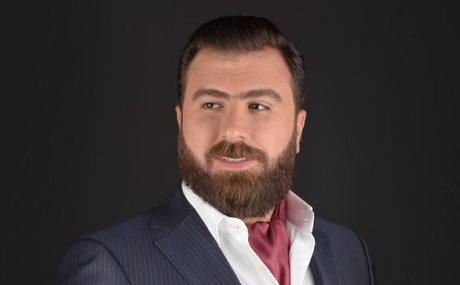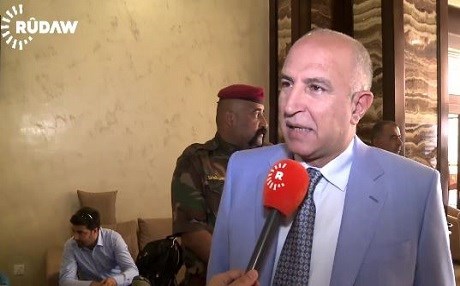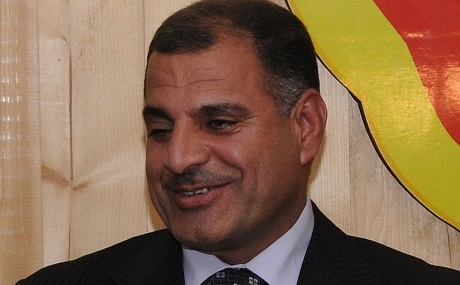ERBIL, Kurdistan Region – Four Iraqis, including two Hashd al-Shaabi paramilitia leaders, have been sanctioned by the US Treasury for alleged corruption and human rights abuses, the Office of Foreign Assets Control (OFAC) announced Thursday.
The sanctioned individuals include Rayan al-Kildani, who is the leader of a Christian Hashd faction called the Babylon Movement, Waad Qado, who is head of Hashd’s Shabak 30th Brigade, former Nineveh governor Nawfal Hamadi, and former Saladin governor and current MP Ahmed al-Jabouri
“The United States is taking action against four individuals in Iraq implicated in serious human rights abuse or corruption,” said Sigal Mandelker, the Treasury’s Under Secretary for Terrorism and Financial Intelligence, said in a statement.
“We will continue to hold accountable persons associated with serious human rights abuse, including persecution of religious minorities, and corrupt officials who exploit their positions of public trust to line their pockets and hoard power at the expense of their citizens,” she added.
The US Treasury said the corruption and human rights abuses of the four individuals were committed in “areas where persecuted religious communities are struggling to recover from the horrors inflicted on them” by the Islamic State group (ISIS).
“As a result of today’s actions, all property and interests in property of these individuals, and any entities that are owned, directly or indirectly, 50 percent or more by these individuals, that are in the United States or in the possession or control of US persons must be blocked and reported to OFAC.”
One of those sanctioned, Rayan al-Kildani, is head of the Babylon Movement and leader of the 50th Brigade, a Christian faction within Hashd al-Shaabi.
“In May 2018, a video circulated among Iraqi human rights civil society organizations in which al-Kildani cut off the ear of a handcuffed detainee,” the US Treasury claimed.
Kildani’s 50th Brigade was accused of being the “primary impediment” to the return of internally displaced persons (IDPs) to the Nineveh Plains. The Treasury accused the militia of systematically looting homes in the town of Batnaya and selling confiscated farmland.
As for Waad Qado, also known as Abu Jaafar al-Shabaki, head of the Shabak 30th Brigade militia of Hashd al-Shaab, he was accused of extracting money from the mixed Christian-Shabak town of Bartella on the Nineveh Plain “through extortion, illegal arrests and kidnappings”.
“Waad Qado (Qado) was designated for being a foreign person who is or has been a leader or official of an entity, including any government entity, that has engaged in, or whose members have engaged in, serious human rights abuse relating to the leader’s or official’s tenure,” said the Treasury.
Qado is the brother of a serving Shabak MP in the Iraqi parliament, Hunein Qado, who has previously denied allegations of land expropriation by his brother’s militia.
“Members of the local population allege that the 30th Brigade has been responsible for egregious offenses including physical intimidation, extortion, robbery, kidnapping, and rape,” the Treasury statement added.
Bartella is historically a Christian town on the Nineveh Plains, but violence against Christians in the past, and their displacement during the ISIS conflict has changed the town’s ethno-religious demographic. The Shabak militia has reportedly impeded the return of Christians.
The two civilian individuals sanctioned were accused of corruption, including “misappropriation of state assets, the expropriation of private assets for personal gain, corruption related to government contracts or the extraction of natural resources or bribery”.
One of them is Nawfal Hamadi (Akoub), the former governor of Nineveh who was sacked by Iraq’s parliament on March 24 following a tragic ferry incident in Mosul that claimed the lives of more than 100 people.
There is a warrant out for Hamadi’s arrest. An investigation by Iraq’s Integrity Commission, which published its findings on April 22, found almost $64 million had been embezzled from Nineveh’s coffers by employees close to Hamadi.
“Al-Sultan [Nawfal Hamadi] has faced allegations of widespread corruption since 1994. He was removed from his first post as mayor because of corruption and a conviction on smuggling charges. In 2017, the United Nations Development Program suspended reconstruction projects after multiple allegations of al-Sultan siphoning off United Nations funds,” the Treasury said.
The fourth individual, Ahmed al-Jabouri, also known as Abu Mazn (Father of Mazn), is the former governor of Saladin and a current MP in the Iraqi parliament. He is also accused of corruption.
Jabouri is part of the leadership of National Axis Alliance, an influential Sunni group commanded by Khamis al-Khanjar. The group is well known for its dealings with Hashd al-Shaabi political parties to secure candidates in office.
“Al-Jabouri was removed as governor and sentenced to prison in July 2017 upon conviction for misusing authority and federal funds and appropriating land for personal use. Al-Jabouri has since been released. Al-Jabouri has been known to protect his personal interests by accommodating Iran-backed proxies that operate outside of state control,” the Treasury said.
Just a day before the election of a new Nineveh governor, sources who spoke to Rudaw accused Jabouri of bribing provincial council members to vote for his party’s candidate.
All four were sanctioned under the Global Magnitsky Human Rights Accountability Act, a US law to sanction individuals involved in human rights abuses and corruption.
The sanctioned individuals include Rayan al-Kildani, who is the leader of a Christian Hashd faction called the Babylon Movement, Waad Qado, who is head of Hashd’s Shabak 30th Brigade, former Nineveh governor Nawfal Hamadi, and former Saladin governor and current MP Ahmed al-Jabouri
“The United States is taking action against four individuals in Iraq implicated in serious human rights abuse or corruption,” said Sigal Mandelker, the Treasury’s Under Secretary for Terrorism and Financial Intelligence, said in a statement.
“We will continue to hold accountable persons associated with serious human rights abuse, including persecution of religious minorities, and corrupt officials who exploit their positions of public trust to line their pockets and hoard power at the expense of their citizens,” she added.
The US Treasury said the corruption and human rights abuses of the four individuals were committed in “areas where persecuted religious communities are struggling to recover from the horrors inflicted on them” by the Islamic State group (ISIS).
“As a result of today’s actions, all property and interests in property of these individuals, and any entities that are owned, directly or indirectly, 50 percent or more by these individuals, that are in the United States or in the possession or control of US persons must be blocked and reported to OFAC.”
One of those sanctioned, Rayan al-Kildani, is head of the Babylon Movement and leader of the 50th Brigade, a Christian faction within Hashd al-Shaabi.
Rayan al-Kildani. Photo: Facebook
“In May 2018, a video circulated among Iraqi human rights civil society organizations in which al-Kildani cut off the ear of a handcuffed detainee,” the US Treasury claimed.
Kildani’s 50th Brigade was accused of being the “primary impediment” to the return of internally displaced persons (IDPs) to the Nineveh Plains. The Treasury accused the militia of systematically looting homes in the town of Batnaya and selling confiscated farmland.
As for Waad Qado, also known as Abu Jaafar al-Shabaki, head of the Shabak 30th Brigade militia of Hashd al-Shaab, he was accused of extracting money from the mixed Christian-Shabak town of Bartella on the Nineveh Plain “through extortion, illegal arrests and kidnappings”.
Waad Qado. Photo: Facebook
“Waad Qado (Qado) was designated for being a foreign person who is or has been a leader or official of an entity, including any government entity, that has engaged in, or whose members have engaged in, serious human rights abuse relating to the leader’s or official’s tenure,” said the Treasury.
Qado is the brother of a serving Shabak MP in the Iraqi parliament, Hunein Qado, who has previously denied allegations of land expropriation by his brother’s militia.
“Members of the local population allege that the 30th Brigade has been responsible for egregious offenses including physical intimidation, extortion, robbery, kidnapping, and rape,” the Treasury statement added.
Bartella is historically a Christian town on the Nineveh Plains, but violence against Christians in the past, and their displacement during the ISIS conflict has changed the town’s ethno-religious demographic. The Shabak militia has reportedly impeded the return of Christians.
The two civilian individuals sanctioned were accused of corruption, including “misappropriation of state assets, the expropriation of private assets for personal gain, corruption related to government contracts or the extraction of natural resources or bribery”.
One of them is Nawfal Hamadi (Akoub), the former governor of Nineveh who was sacked by Iraq’s parliament on March 24 following a tragic ferry incident in Mosul that claimed the lives of more than 100 people.
Nawfal Hamadi. Photo: Rudaw TV
There is a warrant out for Hamadi’s arrest. An investigation by Iraq’s Integrity Commission, which published its findings on April 22, found almost $64 million had been embezzled from Nineveh’s coffers by employees close to Hamadi.
“Al-Sultan [Nawfal Hamadi] has faced allegations of widespread corruption since 1994. He was removed from his first post as mayor because of corruption and a conviction on smuggling charges. In 2017, the United Nations Development Program suspended reconstruction projects after multiple allegations of al-Sultan siphoning off United Nations funds,” the Treasury said.
The fourth individual, Ahmed al-Jabouri, also known as Abu Mazn (Father of Mazn), is the former governor of Saladin and a current MP in the Iraqi parliament. He is also accused of corruption.
Ahmed al-Jabouri. Photo: Wikipedia
Jabouri is part of the leadership of National Axis Alliance, an influential Sunni group commanded by Khamis al-Khanjar. The group is well known for its dealings with Hashd al-Shaabi political parties to secure candidates in office.
“Al-Jabouri was removed as governor and sentenced to prison in July 2017 upon conviction for misusing authority and federal funds and appropriating land for personal use. Al-Jabouri has since been released. Al-Jabouri has been known to protect his personal interests by accommodating Iran-backed proxies that operate outside of state control,” the Treasury said.
Just a day before the election of a new Nineveh governor, sources who spoke to Rudaw accused Jabouri of bribing provincial council members to vote for his party’s candidate.
All four were sanctioned under the Global Magnitsky Human Rights Accountability Act, a US law to sanction individuals involved in human rights abuses and corruption.













Comments
Rudaw moderates all comments submitted on our website. We welcome comments which are relevant to the article and encourage further discussion about the issues that matter to you. We also welcome constructive criticism about Rudaw.
To be approved for publication, however, your comments must meet our community guidelines.
We will not tolerate the following: profanity, threats, personal attacks, vulgarity, abuse (such as sexism, racism, homophobia or xenophobia), or commercial or personal promotion.
Comments that do not meet our guidelines will be rejected. Comments are not edited – they are either approved or rejected.
Post a comment